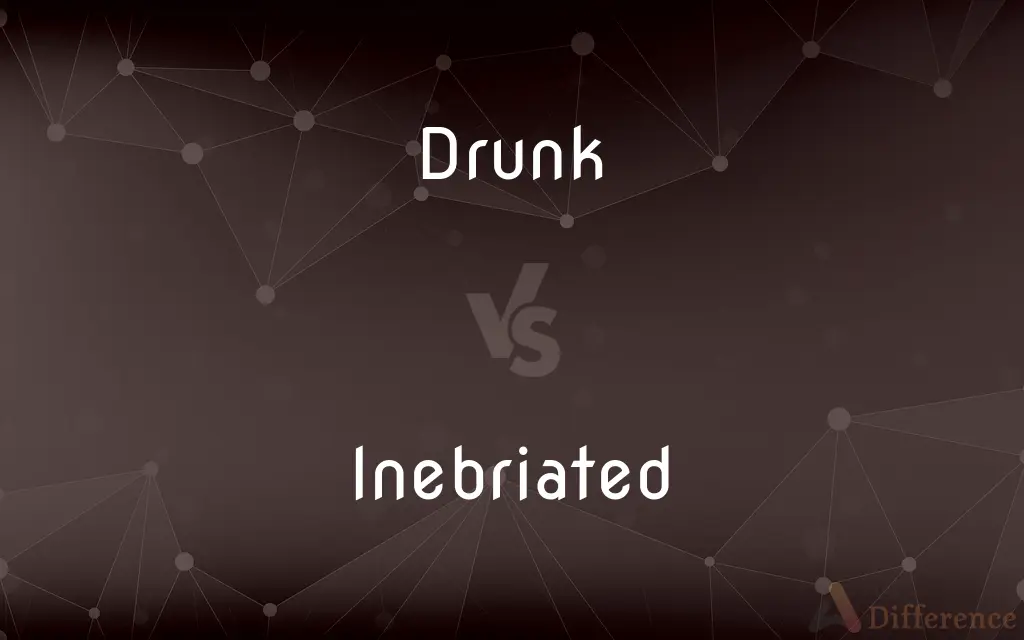Drunk vs. Inebriated — What's the Difference?
By Tayyaba Rehman & Maham Liaqat — Updated on March 5, 2024
"Drunk" is a casual term for being impaired by alcohol, affecting physical and mental functions. "Inebriated" is more formal, also describing alcohol impairment but with a clinical or legal tone.

Difference Between Drunk and Inebriated
Table of Contents
ADVERTISEMENT
Key Differences
Drunk is a term widely used in everyday language to describe someone who has consumed alcohol to the extent that their physical and mental abilities are significantly impaired. It's commonly used in social contexts and carries a variety of cultural connotations, from negative implications of excessive consumption to more neutral or even positive associations with socializing and celebration. On the other hand, inebriated is a term that, while essentially synonymous with drunk, often appears in more formal or official contexts, such as medical, legal, or journalistic writing. It suggests a similar level of alcohol-induced impairment but does so with a language that may be perceived as less judgmental or colloquial.
The perception of someone being drunk can vary widely, influenced by social, cultural, and individual factors. It can range from slight tipsiness to severe intoxication, often judged by visible signs of impairment or changes in behavior. In contrast, inebriated, despite its formal tone, does not specify the degree of impairment, leaving that to be determined by the context in which it is used. Both terms describe a spectrum of alcohol effect, but the choice of word can affect the perceived seriousness or professionalism of the discussion.
The term inebriated is often preferred due to its formal tone, which can convey the seriousness of situations involving alcohol impairment, such as driving under the influence (DUI) or public intoxication charges. The use of drunk in these contexts, while not incorrect, might not always capture the gravitas that legal or formal communications aim to convey. Similarly, in medical discussions, inebriated might be used to describe a patient's condition with precision and without the casual connotations that drunk might imply.
Despite these nuances, the choice between drunk and inebriated can sometimes simply reflect personal or stylistic preferences, especially in informal settings where the implications of alcohol consumption are understood without needing the precision of formal language. The societal and cultural backdrop also plays a role in how these terms are received and interpreted, with attitudes towards alcohol consumption influencing the perceived negativity or acceptability of being in such states.
While drunk and inebriated both refer to the impairment caused by alcohol consumption, their usage can signal differences in tone, context, and sometimes the perceived severity of the impairment. Choosing between them depends on the setting, the audience, and the speaker's or writer's intent, reflecting the flexibility of language to adapt to varying circumstances.
ADVERTISEMENT
Comparison Chart
Tone
Casual, colloquial
Formal, clinical, legal
Context
Everyday language, social settings
Official reports, medical, legal contexts
Connotations
Varies from negative to neutral/positive
Generally neutral, professional
Degree of Impairment
Broad spectrum, contextually determined
Implies impairment, specific degree unspecified
Preferred Usage
Social conversations, informal writing
Formal discussions, documentation
Compare with Definitions
Drunk
A common term for alcohol effect.
He doesn't like the feeling of being drunk.
Inebriated
Clinically or legally intoxicated.
The report described the patient as inebriated upon admission.
Drunk
Impaired by alcohol.
She was too drunk to drive home safely.
Inebriated
A professional term for alcohol intoxication.
Inebriated individuals may require medical attention.
Drunk
Colloquially intoxicated.
The party left everyone feeling drunk and merry.
Inebriated
Used in formal contexts to describe drunkenness.
The officer noted the suspect was visibly inebriated.
Drunk
Informal state of inebriation.
After two drinks, she felt slightly drunk.
Inebriated
Indicates a serious tone of impairment.
The legal consequences of being inebriated while driving are severe.
Drunk
Exhibiting signs of alcohol consumption.
He became very loud and animated when drunk.
Inebriated
Formally impaired by alcohol.
The driver was found to be inebriated by the roadside test.
Drunk
Intoxicated with alcoholic liquor to the point of impairment of physical and mental faculties.
Inebriated
Intoxicated with alcohol; drunk
The inebriated partygoers were very loud.
Drunk
Caused or influenced by intoxication.
Inebriated
Behaving as though affected by alcohol including exhilaration, and a dumbed or stupefied manner.
Drunk
As a result of excessive alcohol consumption, usually by drinking alcoholic beverages.
Inebriated
Under the influence of alcohol; intoxicated; drunk.
Drunk
Someone who is intoxicated
Inebriated
Stupefied or excited by a chemical substance (especially alcohol);
A noisy crowd of intoxicated sailors
Helplessly inebriated
Drunk
As if under the influence of alcohol;
Felt intoxicated by her success
Drunk with excitement
Common Curiosities
What does it mean to be drunk?
Being drunk means having consumed alcohol to the point where physical and mental functions are noticeably impaired.
What does inebriated mean?
Inebriated is a formal term for being affected by alcohol, similar to being drunk, but often used in clinical, legal, or professional contexts.
Is being drunk different from being inebriated?
While the basic meaning is the same, the context and tone differ; drunk is more casual, whereas inebriated is more formal.
Why might someone use inebriated instead of drunk?
Inebriated might be chosen for its formal tone, especially in professional, legal, or medical discussions about alcohol impairment.
How does alcohol consumption lead to being drunk or inebriated?
Alcohol consumption affects the central nervous system, leading to impaired judgment, coordination, and reaction times, described as being drunk or inebriated.
Do legal documents prefer the term inebriated?
Yes, legal documents often use inebriated to convey the seriousness of alcohol-related offenses or conditions formally.
How do societal views affect the use of drunk vs. inebriated?
Societal and cultural attitudes towards alcohol influence whether being drunk is seen negatively or more acceptably, whereas inebriated typically remains neutral and formal.
Is one term more accurate than the other in describing alcohol impairment?
Neither term is inherently more accurate; the choice depends on context, desired tone, and specific circumstances of impairment.
Can the term drunk have positive connotations?
Yes, in some social and cultural contexts, being drunk can have neutral or positive associations with celebration and sociability.
Is inebriated a clinical term?
Inebriated can be used clinically to describe a state of alcohol-induced impairment without the casual connotations of drunk.
Can someone be slightly inebriated?
Yes, inebriated, like drunk, can describe a range of impairment levels, though the context might influence the perceived degree of intoxication.
Are there any legal implications of describing someone as drunk vs. inebriated?
While both terms describe alcohol impairment, inebriated may be preferred in legal contexts for its formal tone and perceived objectivity.
Is there a preferred term in addiction and recovery contexts?
In addiction and recovery, the context and the preference of the individuals involved typically dictate the choice of terms, aiming for language that supports recovery and understanding without judgment.
What are the social implications of being publicly drunk or inebriated?
Public perceptions vary widely, but being seen as drunk or inebriated can affect one's social image, potentially leading to stigma or social repercussions, especially in contexts where alcohol consumption is frowned upon.
Can the choice between drunk and inebriated affect public messaging about alcohol?
Yes, using inebriated in public health messages may convey a more serious or clinical warning about alcohol consumption, while drunk might be perceived as less formal.
Share Your Discovery

Previous Comparison
Brought vs. Bought
Next Comparison
Cupidity vs. CupidAuthor Spotlight
Written by
Tayyaba RehmanTayyaba Rehman is a distinguished writer, currently serving as a primary contributor to askdifference.com. As a researcher in semantics and etymology, Tayyaba's passion for the complexity of languages and their distinctions has found a perfect home on the platform. Tayyaba delves into the intricacies of language, distinguishing between commonly confused words and phrases, thereby providing clarity for readers worldwide.
Co-written by
Maham Liaqat















































